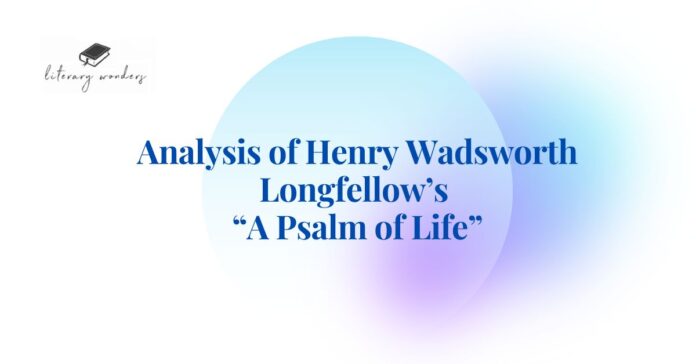Analysis of Henry Wadsworth Longfellow’s “A Psalm of Life”
Summary of “A Psalm of Life”
Written by Henry Wadsworth Longfellow, a famed English writer and poet, “A Psalm of Life” is a dramatic monologue. First published in 1838, the poem declares that one should enjoy life. It reinforces the idea that living in the present is godlier than the austere. It begins when the speaker begs the psalmist not to present him with a negative and bleak picture of life. To him, life is not confined to any religious theory. He denies the Christian belief that life is a precursor to eternal life. He argues that life is intense and full of meanings.
The purpose of it should not reach death. He believes that the human body has declined it has to return to dust. However, the soul has no demise; it should be full of love. The speaker encourages people to act in ways that create progress daily and not indulge in misery or assume that life is just a precursor to eternal life after death.
Also, he advises living in the present, wholeheartedly and in plain view of God, and being inspired by the examples of great men who lived godly and spiritually. The speaker encourages humanity to seize the day, live fearlessly and make progress, and find inspiration in the memories of those who lived godly and spiritually.
Thus, it is a powerful poem that encourages the reader to make the most of their time on earth, embrace death as a natural part of life and not dwell in the past or dream of the future but act in the present moment.
To read the full poem, please click here.
Themes in “A Psalm of Life”
“A Psalm of Life” explores the themes of life, death, and the importance of living every moment to the fullest. The poem encourages readers to embrace life and make the most of every opportunity that comes their way.
One of the poem’s main themes is life’s fleeting nature. The speaker reminds readers that life is short and that we should not waste any of it. He urges us to make the most of every day and to live fully, with passion and purpose. He reminds us that life is a journey and that we should not be afraid to take risks and explore new opportunities.
The idea of death is another important theme of the poem. The speaker acknowledges that death is an inevitable part of life and that we should not be afraid of it. Instead, he encourages us to embrace death as a natural part of the cycle of life and to use it as a reminder to live fully and make the most of every moment. He reminds us that death is not the end but rather the beginning of something new.
Besides the important themes, the poem also explores the legacy and the impact we leave behind. The speaker encourages readers to make a difference in the world and to leave a lasting legacy. He reminds us that our actions and choices can shape the world and that we should strive to impact those around us positively.
In addition to these themes, the poem also touches on hope and the importance of perseverance. The speaker reminds us that life is full of challenges and obstacles but that we should never give up. He encourages us to keep moving forward and to have hope for a better future.
Conclusion
To conclude, “A Psalm of Life” is a powerful and thought-provoking poem that encourages readers to embrace life and make the most of every moment. The themes of life, death, legacy, hope, and perseverance are woven throughout the poem, making it a timeless piece of literature that resonates with readers of all ages.
Suggested Readings
Analysis of “Power” by Audre Lorde
How does the theme of “The Tide Rises the Tide Falls” develop as the poem moves forward?










